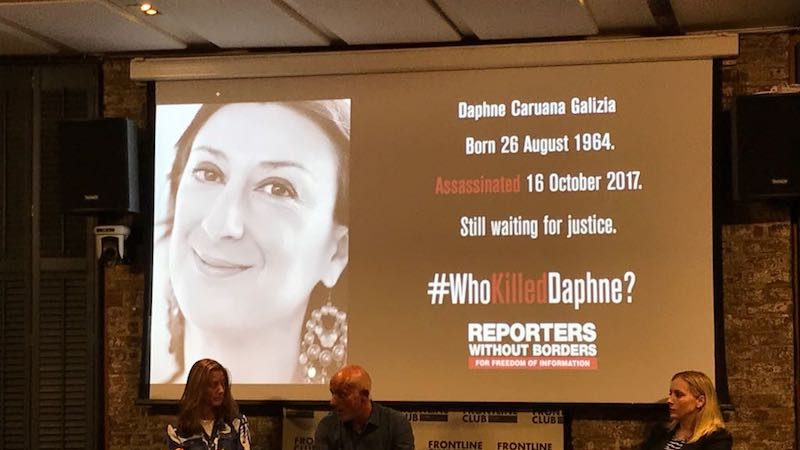Daphne Caruana Galizia’s story sheds new light on the relationship between journalists and power, Italian journalist Carlo Bonini said.
Speaking in London where the documentary he produced on Caruana Galizia together with his colleague from La Repubblica Giuliano Foschini was screened, Bonini said “What is sad is that what is happening in Malta, is happening everywhere else, including in the US. If journalists cannot hold political figures to account, this is the beginning of the end of democracy.”
He added that the implications of the assassination resonate beyond Malta and “what is happening in Malta affects democracy and press freedom in the rest of the EU”
The documentary focusing on the motives behind the assassination of Caruana Galizia was screened on Wednesday evening at the Frontline Club in London, and was followed by a debate that included the participation of The Shift News’ Caroline Muscat.
The event entitled ‘Who Killed Daphne?‘ was a great success and all tickets were sold out. The documentary was followed by a debate chaired by Rebecca Vincent, from Reporters Without Borders (RSF).
Caruana Galizia’s assassination sent out a clear message intended to silence journalists, Muscat said, adding that The Shift News was created to send a message back that journalists cannot be silenced.
Muscat added that despite government’s attempts to obfuscate Caruana Galizia’s work and her memory, the slain journalist will not be forgotten.
“People should read Daphne’s blog as what she wrote i is as relevant today as it was before her death and if it were up to government all this is dead and buried but one answer we can give back is to make sure she is never forgotten.”
Bonini also weighed in on the Egrant inquiry and questioned how it was carried out and how it is being handled by government.
Muscat said the inquiry report is being withheld from the public and Prime Minister Joseph Muscat – who was subject of the inquiry – has full access to the report.
Describing how Muscat’s head of communication Kurt Farrugia “taunted” the public by tweeting a photo of the printed report, Muscat said that one month after the inquiry was concluded “government is using the report to frame its own narrative and discredit activists, journalists and politicians who are critical of government.”
1,500 pages of lies, fabrications, as well as falsification of docs, in one massive lie on #Malta PM @JosephMuscat_JM. @SimonBusuttil who perpetrated this vicious lie has not yet announced he is resigning as MP. To the @PNmalta Good Governance (sic) spokesperson – #barra #barra. pic.twitter.com/sn0RFPawEA
— Kurt Farrugia (@KurtFarrugia) July 22, 2018
Asked whether he believes Henley and Partners – the concessionaires of Malta’s controversial cash-for-passport scheme – were involved in helping elect Joseph Muscat in 2013, Bonini said that although there is no proof of this “there is circumstantial evidence that shows that this is likely” given Henley and Partner’s involvement in elections in the Caribbean and its alleged links to Cambridge Analytica.
British political magazine The Spectator had linked the two companies and according to an article entitled ‘Revealed: Cambridge Analytica and the passport king’ Alexander Nix, the suspended CEO of Cambridge Analytica and the chairman of Henley and Partners, Christian Kalin collaborated in a number of electoral campaigns in the Caribbean.













